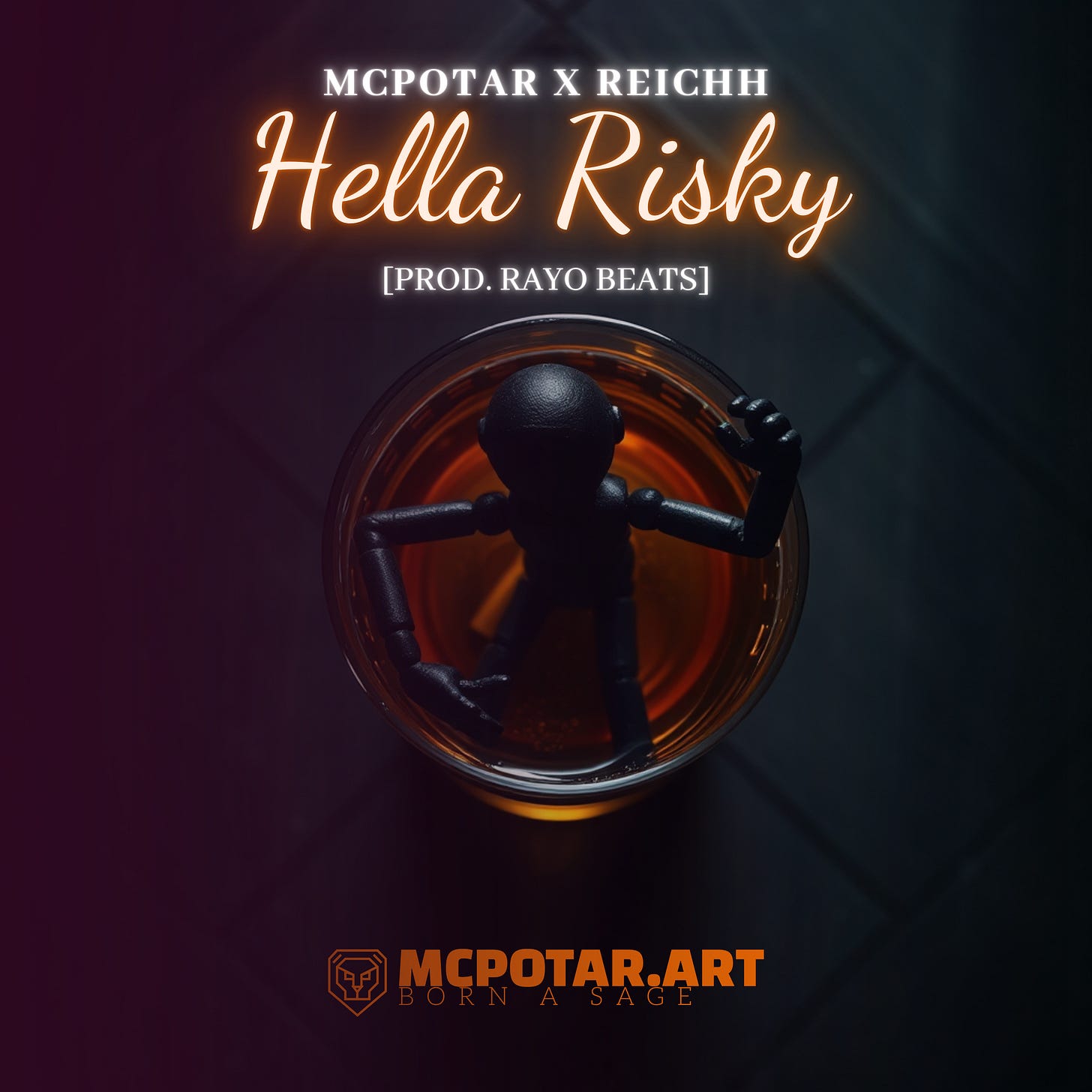Music has always been a vessel for both entertainment and thought-provoking messages, and "Hella Risky" by Mcpotar featuring Reichh is no exception. Produced by Rayo Beats, this track carries a catchy Afrobeat rhythm while embedding conscious themes of systemic control, addiction, and the struggles of modern life. It presents a juxtaposition of vibrant production with deeply introspective and critical lyricism.
Open the song in the next tab
HOOK (Reichh): A Chorus of Struggles
The song opens with Reichh’s haunting chorus:
Drowning in my sorrows, I don’t know where to go-oh, I tried my best to follow, Religions, and the life,
This hook sets the tone for the song, reflecting inner turmoil and a search for meaning. The repetition of “Life hella risky, diluter whiskey, silent and fishy” reinforces the dangers of modern existence—whether it be through systemic oppression, addiction, or unseen forces manipulating everyday life. The “diluter whiskey” line suggests the numbing of pain through alcohol, while “silent and fishy” hints at the hidden agendas behind societal structures.
Verse 1: Mcpotar’s Perspective
Mcpotar’s first verse introduces aggression and resistance:
I’m in the kitchen, cutting the chicken, I got aggression,
The imagery here represents daily survival, but also frustration with a system that confines him. He directly addresses religious gatekeeping:
Handibvumidzwe, kuparidza mu church yenyu?
(Translation: Am I not allowed to preach in your church?)
This rhetorical question challenges the exclusivity of religious institutions, hinting at hypocrisy in faith-based spaces. He then highlights how these institutions fear alternative viewpoints:
Poison your brethren, say ndiri mu Heden?
(Translation: They fear I will “poison” the system, so they call me a heathen.)
Muchapinda Heaven?
This line critiques the holier-than-thou attitude, questioning whether these self-proclaimed righteous individuals truly have the authority to determine divine judgment.
Mcpotar transitions into his financial philosophy:
I put my money first in, that is called investing,
This line cleverly rhymes with “manifesting,” emphasizing that he prioritizes investment in his craft, leading to future success despite present struggles.
He also critiques the manipulation of narratives:
Gossip is your story, missing out my version.
A direct jab at misinformation, where dominant narratives are used to control perspectives while alternative viewpoints are censored.
Verse 2: Reichh’s Perspective
Reichh’s verse introduces an even more personal battle against oppression:
You take all my rights, hands full of blood, in me there is no fight, I'm left with the bottle.
This line exposes a sense of powerlessness, where oppression forces individuals into self-destructive habits. He then tries to rise above:
Battling decisions tryna stay alive, you tryna break me down, but you can’t keep me down.
This is an anthem of resilience, showing that despite the hardships, he refuses to be broken. She embraces individuality:
Born to be different, make all the difference.
This line challenges conformity and encourages listeners to create change. The theme of breaking free is evident:
We break the cuffs off our hands, now it's time that we can run.
A powerful metaphor for liberation, whether from mental chains, societal limitations, or oppressive regimes.
Verse 3: Mcpotar’s Deep Social Commentary
Mcpotar’s final verse leans heavily into political and social critique:
When they say it’s gonna fly, then it’s gonna go!
The “they” represents the power structure—global elites, corporations, and governments. When they decide something will happen, it does, because they control the system.
If the people don’t arise, as the corner-stone,
Here, he urges the masses to awaken and reclaim agency before it’s too late. He critiques African leadership:
There’s a blister, in the eyes, of the honourable,
A direct reference to African leaders who are blinded, either by corruption or manipulation, leaving their nations vulnerable to global superpowers like the USA, Russia, and China.
Well they back at, what, they had worked on, when, they had traps for us, just to work for them.
This verse references historical exploitation, from colonial times to modern neo-colonial practices. The mention of Errol Musk’s racist comments further underlines the point that systemic racism and exploitation persist.
Addiction, Violence, and Survival
Mcpotar then shifts to the consequences of these struggles:
Losses and victory, I am not a victim! Coke, ice, and whiskey, die in addiction.
He acknowledges the destructive paths people take to escape hardship. The next bars paint a bleak picture:
Violence, infections, life in the fiction, Knives get 'em slit when they fight on the weekend.
This highlights the grim realities of street violence, fueled by societal issues. The mention of fiction suggests a disconnect between what people believe and the harsh truths they ignore.
The Artwork: A Puppet in a Glass of Whiskey
The accompanying artwork of a black wooden puppet submerged in a glass of whiskey is a striking allegory. The puppet symbolizes the duality of oppression—being controlled by both external forces (the system) and internal struggles (addiction). It is a visual representation of drowning in imposed limitations while seeking solace in self-destructive habits.
Final Thoughts: Afrobeat Meets Hip-Hop Consciousness
What makes Hella Risky unique is its ability to carry a deep message within an Afrobeat sound. The beat is catchy, making it accessible to a broader audience, yet the lyricism is deeply rooted in hip-hop’s tradition of speaking truth to power. This fusion allows the song to resonate on multiple levels—whether as a danceable track or a thought-provoking critique of society.
Mcpotar and Reichh have crafted a piece that challenges listeners to reflect on their realities, whether it’s systemic oppression, personal struggles, or the choices they make. The song ultimately asks: Are you aware of the risks in life? And if so, how do you navigate them?

